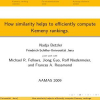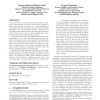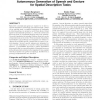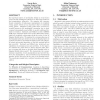ATAL
2009
Springer
15 years 7 months ago
2009
Springer
112
click to vote
ATAL
2009
Springer
15 years 7 months ago
2009
Springer
Whenever rational agents form coalitions to execute tasks, doing so via a decentralized negotiation process—while more robust and democratic—may lead to a loss of efficiency ...
124
click to vote
ATAL
2009
Springer
2009
Springer
Effective solutions for real-world Stackelberg games: when agents must deal with human uncertainties
15 years 7 months ago
How do we build multiagent algorithms for agent interactions with human adversaries? Stackelberg games are natural models for many important applications that involve human intera...
102
click to vote
ATAL
2009
Springer
15 years 7 months ago
2009
Springer
Current trends in model construction in the field of agentbased computational economics base behavior of agents on either game theoretic procedures (e.g. belief learning, fictit...
105
click to vote
ATAL
2009
Springer
15 years 7 months ago
2009
Springer
Recent scaling up of decentralized partially observable Markov decision process (DEC-POMDP) solvers towards realistic applications is mainly due to approximate methods. Of this fa...
ATAL
2009
Springer
15 years 7 months ago
2009
Springer
Investigations of multi-robot systems often make implicit assumptions concerning the computational capabilities of the robots. Despite the lack of explicit attention to the comput...
ATAL
2009
Springer
15 years 7 months ago
2009
Springer
113
click to vote
ATAL
2009
Springer
15 years 7 months ago
2009
Springer
Embodied conversational agents are required to be able to express themselves convincingly and autonomously. Based on an empirial study on spatial descriptions of landmarks in dire...
101
click to vote
ATAL
2009
Springer
15 years 7 months ago
2009
Springer
Coordination of multiple agents under uncertainty in the decentralized POMDP model is known to be NEXP-complete, even when the agents have a joint set of goals. Nevertheless, we s...
113
click to vote
ATAL
2009
Springer
15 years 7 months ago
2009
Springer
An important aspect of mechanism design in social choice protocols and multiagent systems is to discourage insincere and manipulative behaviour. We examine the computational compl...




